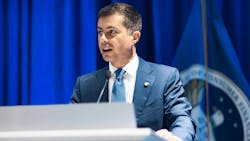Buttigieg Talks Electric Vehicles on Capitol Hill
Yesterday, U.S. Department of Transportation Secretary Pete Buttigieg was questioned by House lawmakers in a hearing over his transportation budget proposal for the next fiscal year.
Many topics were discussed from investments in rebuilding roads and bridges to his feelings on the regulation of the railroad industry. But, during the hearing, Buttigieg was faced with several questions regarding the administration’s push for electric vehicles (EVs).
In 2021, President Biden signed an executive order outlining a goal to have electric and other zero-emissions vehicles make up half of the new cars and trucks sold by 2030. This push towards EVs has impacted the roads and bridges construction industry, as well.
Biden also allotted $5 billion to go toward building fast chargers along major interstates in a program dubbed the National Electric Vehicle Infrastructure (NEVI) program, and the subsequent $2.5 billion dollar program Charging and Fueling Infrastructure (CFI).
Pennsylvania Congressman Scott Perry called the program “dictatorial”.
Buttigieg refuted that accusation and said that, while EVs make up 10% of the market, sales were up to 1.2 million in 2023.
Perry then questioned Buttigieg on how many of these sales were from the government or private entities.
“We'll get you that breakdown but as you know more citizens buy EVs than government purchases,” said Buttigieg.
Perry then said that he was “not happy about the mandate” and said Americans “should be able to buy any vehicle they want.”
“There is no mandate.” Buttigieg said. “You can purchase a gas car if you want to pay gas prices at the pump but if you don't, you can purchase an EV with our help.”
Indiana Congressman Rudy Yakym then turned specifically to the execution of plans for electric vehicle charging stations yet to be rolled out throughout the country.
“After two and a half years, it appears just the ninth NEVI charging station was brought online in Pennsylvania,” Yakym said. He added that other experts he spoke to on the program expected “hundreds of thousands” to be brought online this year.
Buttigieg partially agreed with that statement.
“The bulk of the NEVI chargers will be installed in 2027 and 2028, but I’m impressed to see that the first few hundred will come online this year,” he said.
The conversation evolved to what Yakym said were “delays” with the NEVI program, saying that they have “fallen flat on their face at the start.” Yakym pressed Buttigieg as to why it’s taken so long to get CFI charging stations online with zero so far having been installed.
“It’s not typical, especially on a brand-new program, to do [grants] on a five-month timeframe,” said Buttigieg. “I’m impatient to do them, but I want to make sure nobody moves the goalposts here.”
Ultimately, Buttigieg said Yakym was incorrect to say the programs have been “delayed” given that they are designed to be executed by the second half of the decade.
Source: WIBC.com, Dailymail.com
